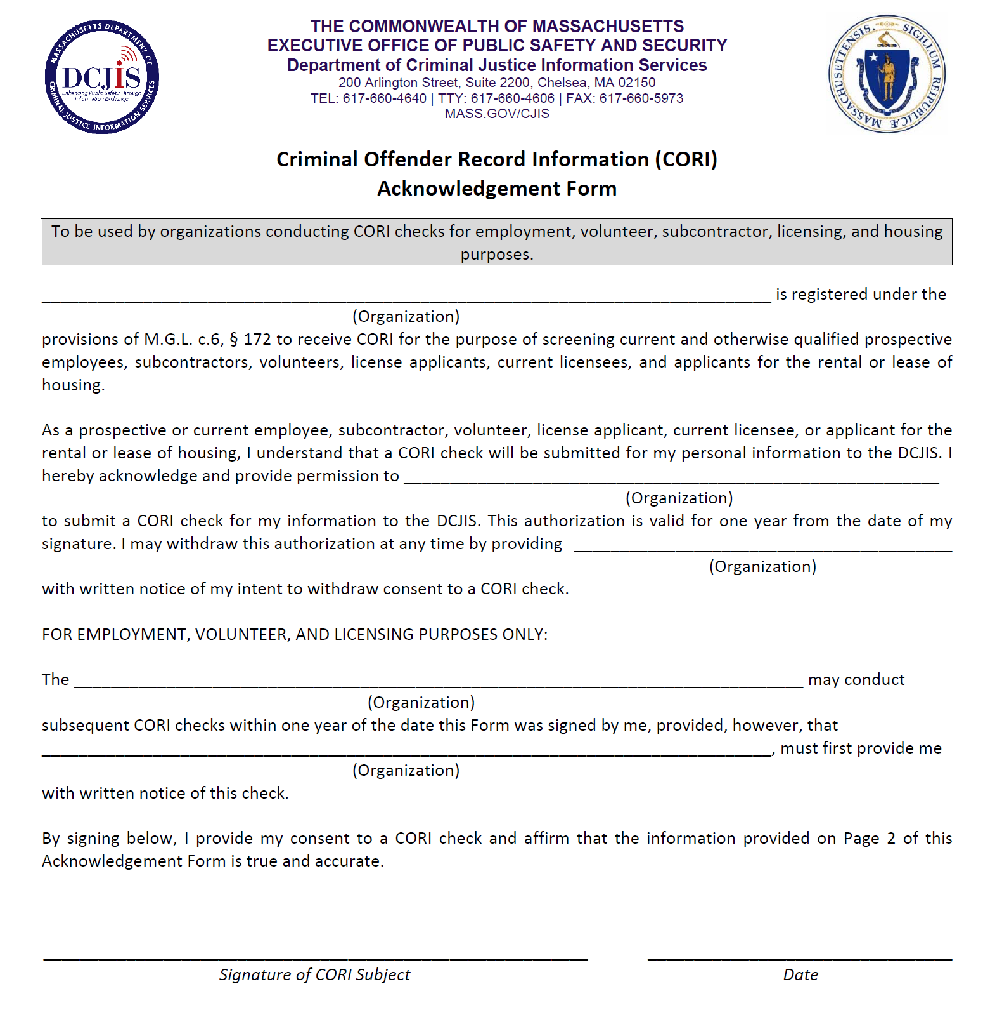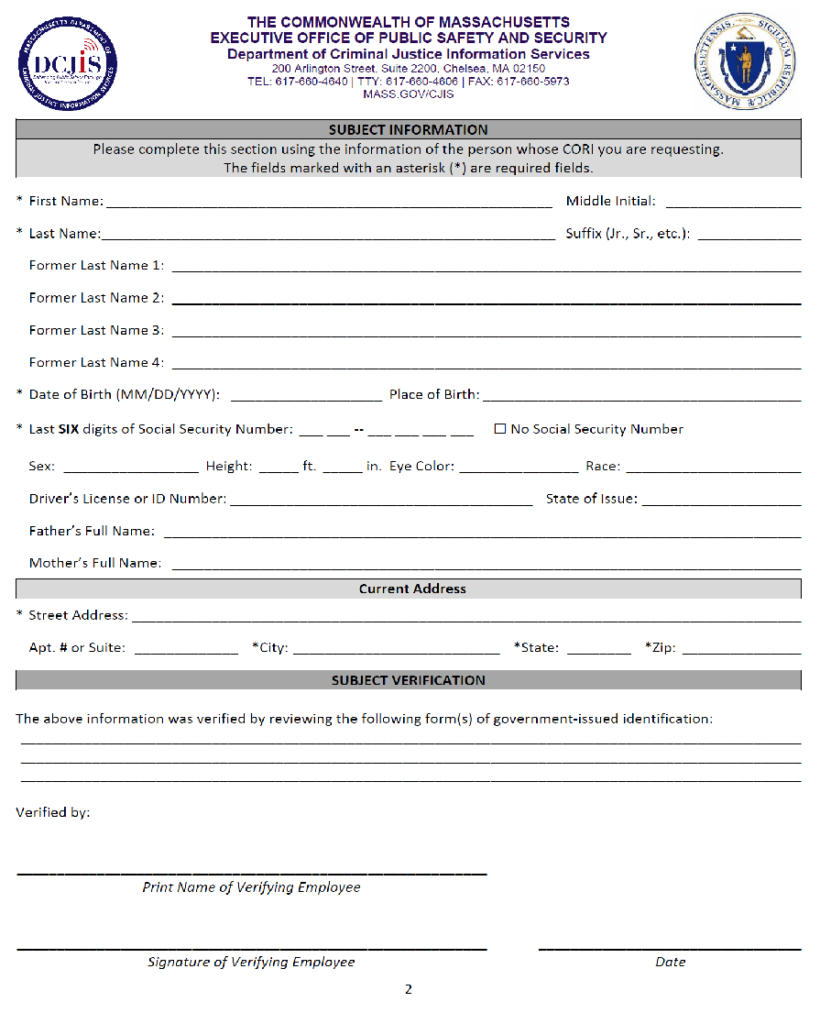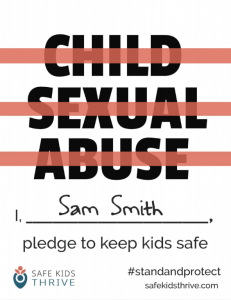Massachusetts’ Juvenile Justice System Response…
Massachusetts’ Juvenile Justice System Response to Problem Sexual Behavior by…
Home / Read the Report
The following questions may be used in a written application or personal interview. A single answer should not determine whether an applicant is selected or rejected. Along with other forms of information, answers to these questions can help build a more complete picture of an applicant. Additional questions may be found in various publications and policies in the “Resource List and Sample Policies” section. (See below and Appendices 6 and 7.)
The application form may also include the following:
The following questions may be useful for reference checks:



One of the most vital layers of a comprehensive screening program is a nationwide criminal-history check. There are essentially two types of criminal-history checks: fingerprint-based and name-based. Fingerprint-based checks offer one advantage as they can help properly identify someone who is using an alias and attempting to avoid detection. Name-based checks offer their own advantages; most notably—greater accessibility and timeliness of results.
The nationwide fingerprint check is a search of the FBI’s master fingerprint file, which can be accessed through state law enforcement agencies. The check involves searching the official state repositories of criminal-history information. These state repositories are maintained in a database called the Integrated Automated Fingerprint Identification System (IAFIS). IAFIS is a national fingerprint and criminal-history system that responds to requests 24 hours a day, 365 days a year. IAFIS searches include arrest records, convictions, juvenile records (if provided by the state), dismissed charges or not-guilty verdicts, warrants, Sex Offender Registry information, physical characteristics (i.e., height, weight, hair, tattoos, and eye color), and aliases. All arrest data included in an Identification Record is obtained from fingerprint submissions, disposition reports, and other information submitted by agencies with criminal justice responsibilities.
Some state search checks allow you to access these records through either a fingerprint or name-based check by submitting the applicant’s name, sex, and date of birth; however, the check may only include a search of the state where the information was submitted. State laws and regulations govern access to these records, and they vary significantly. Therefore, it is important to contact your state repository to determine if these records are accessible when creating background-screening policies. If a nationwide search is not an option, then it is important to check every state in which the applicant has resided. A list of the State Identification Bureaus is available on the FBI Criminal Justice Information Service’s website at: (https://www.fbi.gov/services/cjis/identity-history-summary-checks/state-identification-bureau-listing). The State Identification Bureau for Massachusetts is: Massachusetts State Police State Identification Section, 59 Horse Pond Rd., Sudbury, MA 01776 (508-358-3170).
Private Companies: Another way to obtain a criminal-history check is through a private company. These are name- or social security number- based searches of public court records, state correctional facilities, and state criminal history record repositories. These companies buy the information from the states and create their own proprietary databases. You supply the applicant’s name, date of birth, and/or social security number, and they will provide your results in a report. It is important that the search includes a social security number, if possible, which will provide a history of past and present addresses and names associated with the individual’s SSN, including aliases.
Private vendors return the results rather quickly; and can tailor the depth of a search (and, therefore, cost) based on the risk associated with a position. However, it is important to remember not all states sell their criminal-history information to commercial databases, even if the report says it is a nationwide check. When choosing a private company, it is recommended to inquire about the sources of their information and how often the data is updated. The commercial databases may also be missing important disposition information that is relevant to determine whether an individual was only arrested for versus convicted of a particular offense. It is also important to speak to legal counsel as there are certain legal requirements that organizations must meet in order to protect an individual’s privacy rights and ensure fair use of the information, including compliance with the Fair Credit Reporting Act and state consumer reporting laws. (For further information, visit the Federal Trade Commission, Bureau of Consumer Protection website at: (https://www.ftc.gov/tips-advice/business-center/guidance/what-employment-background-screening-companies-need-know-about)
There are pros and cons to both fingerprint-based and name-based checks. It is therefore recommended that you use a combination of these resources (when available) to minimize the challenges inherent to both types of searches.
What if a Criminal Record is Discovered?
As mentioned above, unless provided otherwise by law, the existence of a criminal record does not necessarily automatically disqualify an applicant from employment or volunteer services with children and youth. In general, if a background check indicates that there is adverse or criminal activity in the applicant’s background, the office (or person) responsible for screening must be able (and have the authority) to determine if the offense prevents or does not prevent the applicant from working safely with children and youth.
It is important to establish assessment criteria defining what will constitute automatic disqualifiers for anyone who works directly with children and youth, and make these criteria known to the applicant. Organizations may wish to consider including the criteria below in their screening policy as factors that may disqualify an applicant. (This list is not exhaustive; an organization may wish to consider additional factors in their screening policy.)
Assessment criteria should be relevant to the needs of the organization and type of work the applicant may be performing. All hiring decisions should be based upon a complete review of the candidate’s qualifications and characteristics.
In Massachusetts, the DCJIS has published guidance on this process and provided the criteria by which to evaluate a criminal record. There are two basic types of disqualification – presumptive and discretionary – and three lists of criminal offenses separated into tables – A, B and C. 2
If a criminal offense on a CORI is listed on Table A, the most egregious and violent offenses, the applicant is presumptively disqualified from employment or service. The screening or hiring authority should notify the applicant immediately and share the findings. The applicant then has the opportunity to rebut the presumption that they are ineligible to work in an environment with children or other vulnerable parties.
If the individual believes that their CORI Report is inaccurate, the office or individual conducting the screening must provide the individual with a copy of the DCJIS packet “Information Concerning the Process in Correcting a Criminal Record.” If the individual’s criminal record is thereafter corrected, the individual can be provided with an opportunity to undergo another CORI check.
If an applicant has a criminal offense that is listed on Table B, the individual is discretionarily disqualified from employment or service. This means that the screening or hiring authority can exercise a measure of discretion in deciding whether the individual is capable of working safely with children and youth. As with offenses listed on Table A, the applicant must be notified immediately and be given the opportunity to rebut the finding of ineligibility by providing additional information (i.e., a letter of reference from a probation officer, the prosecuting district attorney, judge, or a treating mental health professional stating that the individual is unlikely to pose harm to the young or vulnerable).
In these discretionary situations, the individual reviewing the CORI information can also consider and weigh several additional factors on a case-by-case basis. These factors include:
If an applicant has a criminal offense that is listed in Table C, the individual is also discretionarily disqualified from employment or service. As in both circumstances described above, the applicant must be notified immediately and be given the opportunity to rebut the finding of ineligibility by providing additional information. The information the screener may consider for additional review is the same information contained above in items a – h above, with the addition of item “i”: “Any other relevant information, including information submitted by the candidate or requested by the hiring authority, such as letters of reference from the applicant’s probation officer or a treating mental health professional.”
The difference between the process in terms of the offenses listed in Tables B and C is that Table C offenses (although serious) are considered to be the least egregious category of offenses, and do not necessarily require letters of reference to overturn the initial finding as Table B offenses do. Again, the factors that go into the final decision should be documented and kept with the individual’s personnel records. More information on this process can be found on the website of the Department of Criminal Justice Information Services: (https://www.mass.gov/orgs/department-of-criminal-justice-information-services) and on the MA Public Safety website at: (https://www.mass.gov/orgs/executive-office-of-public-safety-and-security).
1 Adapted from Saul J, Audage NC. Preventing Child Sexual Abuse Within Youth-serving Organizations: Getting Started on Policies and Procedures. Atlanta (GA): Centers for Disease Control and Prevention, National Center for Injury Prevention and Control
2 See: (http://www.mass.gov/eopss/docs/dps/inf/inf-amuse-cori-valuation-criteria-table-a-c.pdf)

Join us and commit to learning how you can protect the children you serve.
Trainings /
Massachusetts’ Juvenile Justice System Response to Problem Sexual Behavior by…
Trainings /
Keeping Kids Safe: Staff Training Our Keeping Kids Safe training is designed to make the topic…
Trainings /
Introduction to Safe Kids Thrive Youth-serving organizations (YSOs) across Massachusetts…
Customized child sexual abuse prevention guidelines to meet the unique needs of any organization that serves children.
Safe Kids Thrive is managed by the Children's Trust of Massachusetts
Learning Center Registration
Sign up for an account and start your learning experience.
Free Online Assessment
Let us help you find out where to start.
